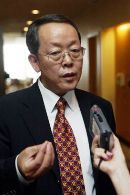China voices opposition to sanctions on Sudan
By Wasil Ali
March 18, 2007 (UNITED NATIONS) — The permanent representative of China Wang Guangya at the UN Security Council (UNSC) said his country opposes any plans to impose sanctions on Khartoum following its rejection of UN-AU hybrid force.
Guangya told reporters at the UN headquarters in New York that Sudan is a sovereign state and is therefore entitled to have reservations on the hybrid force proposal as it is outlined in the Addis Ababa communiqué in November of last year.
 The Sudanese president Omar al-Bashir sent a letter to the UN Secretary General Ban Ki-moon last week suggesting severe limitations on the mandate and numbers of UN personnel in Darfur. The secretary general expressed his dissatisfaction with Bashir’s response and rejected any calls to modify the terms of the Addis Ababa agreement. The US & UK suggested that it may be time that the UNSC move to sanction Sudan for its refusal to let UN peacekeepers into Darfur.
The Sudanese president Omar al-Bashir sent a letter to the UN Secretary General Ban Ki-moon last week suggesting severe limitations on the mandate and numbers of UN personnel in Darfur. The secretary general expressed his dissatisfaction with Bashir’s response and rejected any calls to modify the terms of the Addis Ababa agreement. The US & UK suggested that it may be time that the UNSC move to sanction Sudan for its refusal to let UN peacekeepers into Darfur.
The Chinese ambassador said that it his government’s understanding Khartoum has agreed to the Addis Ababa communiqué but that “as a sovereign state and also as an equal partner in the international efforts to address the issue [Darfur] that they have the right and are entitled to have reservations”.
Wang however acknowledged that Bashir’s response is not “what we expect at the council”. He urged the UN and Sudan to narrow differences rather than widen them through imposing sanctions.
The comments made by Wang is the latest in the series of vague and somewhat contradictory statements made by Chinese officials in their response to Bashir’s letter that was sent last week. The New York Times has quoted a senior UN official on November 16, 2006 that Wang was instrumental in persuading Sudanese officials to accept the UN-AU hybrid force during the negotiations in Addis Ababa last year.
Some analysts have suggested that Beijing was taken aback by Bashir’s recent rejection of the Addis Ababa agreement that they have helped formulate. Reports have also indicated that Beijing is beginning to get concerned that its image in the world is getting tarnished through its continuous support of Khartoum in the Darfur issue.
China buys two-thirds of Sudan‘s oil and is the largest investor in the country. The Chinese president Hu Jintao visited Sudan in January where he signed a series of economic deals. It was also reported that president Hu urged the Sudanese president to accept AU-UN hybrid force in Darfur.
(ST)
